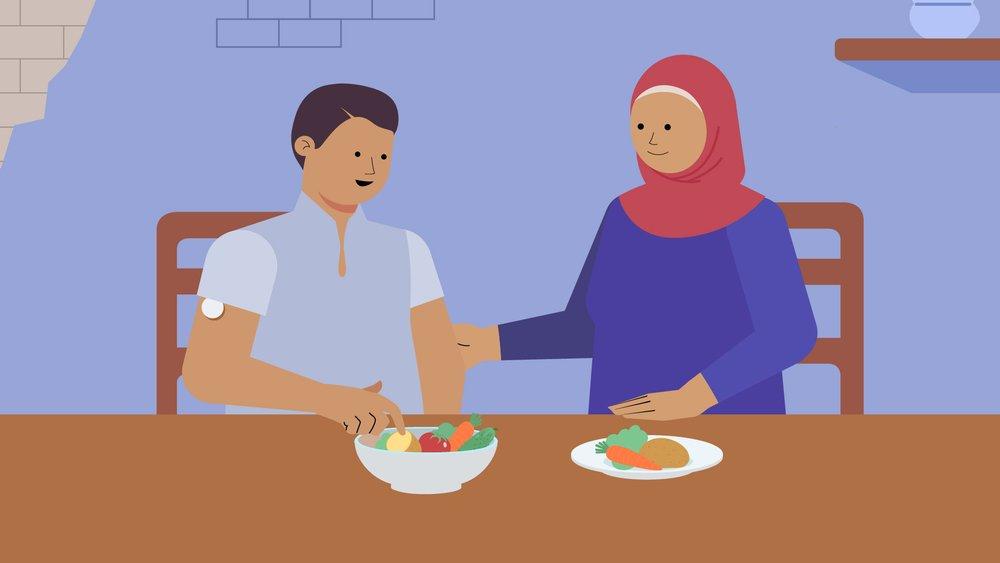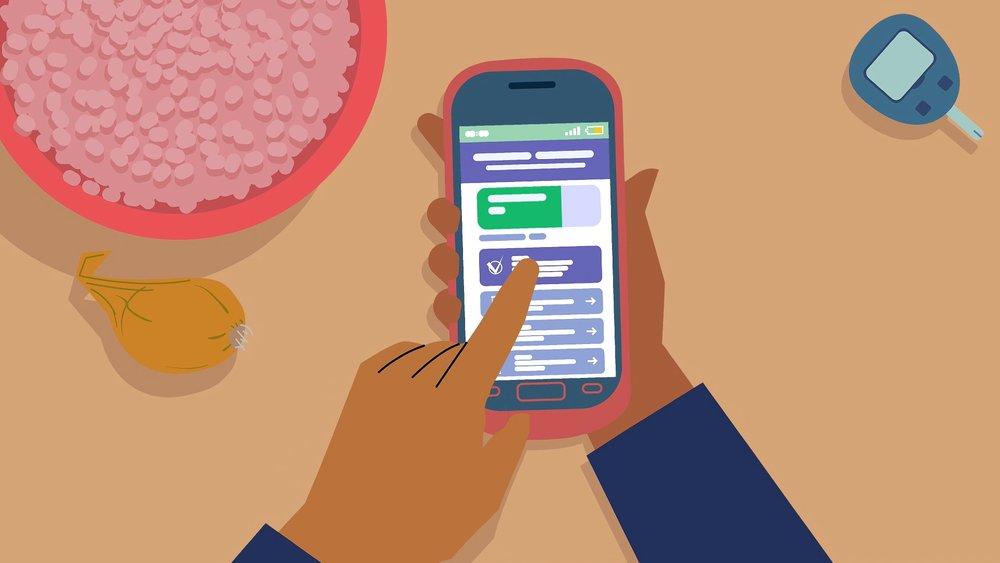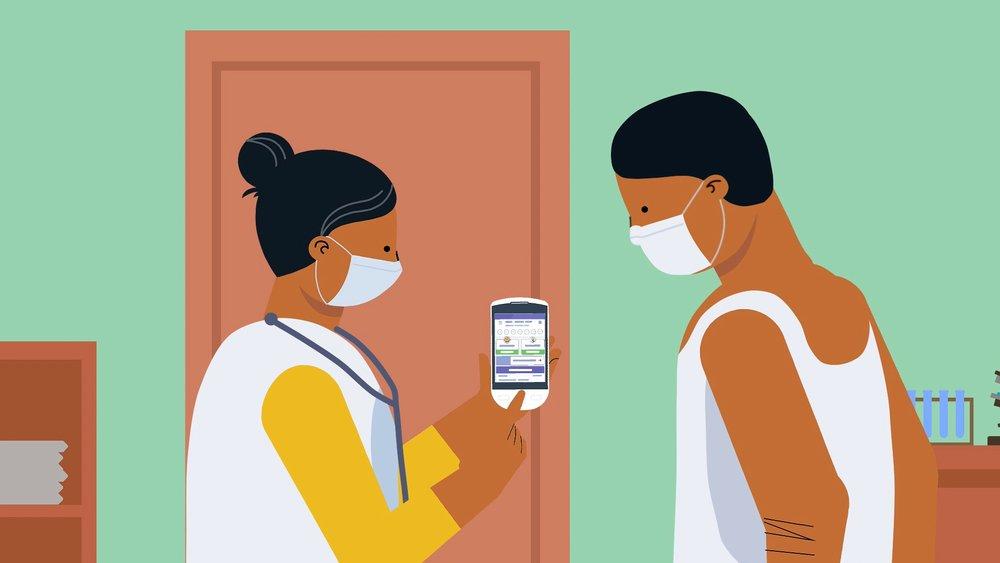An introduction to Digital Therapeutics (DTx) in global health and humanitarian settings

The Digital Therapeutics (DTx) for diabetes case aims to both deliver a patient support intervention and understanding of how DTx may supplement current Doctors Without Borders practices.
Doctors Without Borders / Médecins Sans Frontières (MSF) is committed to becoming increasingly person-centred, working with people as partners and supporting more empowered health decision making. Digital health technologies known as digital therapeutics (DTx) are one way in which this ambition may be realised.
Digital therapeutics are patient-facing platforms (typically a mobile app) offering evidence-based health behaviour change. By co-creating with patients and communities to leverage these DTx tools, patients will be able to more effectively access care and support, learn about their condition and treatment from a new perspective, and build improved practices to access improved quality of life and health outcomes.
Doctors Without Borders is currently exploring and developing DTx for diabetes and DTx for tuberculosis (TB) in collaboration with multiple Doctors Without Borders associated clinics and communities to clarify the potential of DTx in contexts where the health burden is substantial and compounded by conflict, climate breakdown and other socio-economic factors.
What is digital therapeutics (DTx)?
Digital therapeutics are patient support platforms used to encourage long-term behaviour change associated with chronic conditions such as mental health disorders, diabetes or hypertension. Oftentimes, and in the case of Doctors Without Borders DTx, bringing together a bundle of digital (patient-facing mobile platform and clinician dashboard) and in-person health management components including clinic appointments and community-based and peer support. However, some DTx tools may also exist as a standalone intervention not associated with formal clinical care.
In the Doctors Without Borders case, mobile-based DTx tools are provided as an adjunctive intervention to encourage improved patient understanding, and sustained behaviour change via multimedia education, goal setting, medication adherence and appointment reminders and remote monitoring of symptoms and side effects. Such tools differ from other patient-facing digital health applications (e.g., medication reminder apps) in terms of both the multimodal and holistic nature of features provided to the patient, commitment to evidence and impact and the integration within an existing clinical pathway.
Where needed and relevant, DTx can be used to enhance efforts for improved health, however, digital will not always be a fit. It is intended that the progress made with the Doctors Without Borders DTx project for diabetes and tuberculosis also contributes to operational improvements for those who may not want to, or cannot, use a DTx platform. This project intends to reduce the digital divide rather than add a new dimension to it.

Doctors Without Borders DTx approach
As alluded to the ultimate vision of the Doctors Without Borders DTx project is to improve access to high-quality person-centred care for patients living with diabetes and tuberculosis in low-resource and humanitarian settings. This will encourage an improvement in patient outcomes, quality of life and quality of care experienced. To do this we will continue to co-create and share tools, pathways and evidence with a multi-stakeholder group of patients, clinicians, Ministry of Health representatives, technical developers, and others to support patients to confidently self-manage their health between appointments.
A number of guiding principles for this work include:
● Patient centricity - inclusion of patients and caregivers throughout the programme planning, implementation, and evaluation with lived experience taken as priority
● Systems-focused - commitment to creating a tool that integrates with the current Doctors Without Borders system with minimal disruption to workflows and respects the complexities of the current ecosystem
● Privacy and Security - mitigation of risk and contribution to the development of new precedents for digital health privacy and security measures
● Accessibility - creation of interventions in both digital and non-digital formats where applicable to maximise access for patients and caregivers without technical means
● Inclusion - Accessibility for those living with other impairments will also be considered and acted upon throughout the process (e.g. ensuring audio elements are available for those with visual impairments and/or low literacy rates)
● Evidence and impact generation - execution of the needs assessments, feasibility, and pilot studies to understand impact and disseminate learnings Advocacy and Communications - Contribution to evidence, learning and augmentation beyond the DTx element
This is a new endeavour for Doctors Without Borders with multiple projects under development and in-early implementation stages in multiple locations. While each step of this project demands forging new paths and processes it is clear that this effort is justified by the undeniable demand for Doctors Without Borders to scale up access to care that would not be possible through traditional practices.

Digital Therapeutics (DTx) for Diabetes
It is currently estimated that 80 per cent of annual mortality related to non-communicable diseases (NCDs) occur in low- and middle-income countries, according to the WHO. The prevalence of diabetes is high across the Middle East and North African (MENA) region, constituting an increasing public health problem. Lebanon is one of the countries in the region that has experienced a sharp rise in the burden of NCDs, including diabetes, over the last decade. In Lebanon, the estimated prevalence of diabetes in 2021 for people aged 20-79 years is 396 per 1000 people, and it is predicted to increase to 469 per 1000 by 2030, according to data from the International Diabetes Federation.
Due to socio-economic factors and the complex nature of diabetes management adherence to medication among people living with diabetes in low-resource settings is suboptimal. Individuals living with type 1 or type 2 diabetes are also at increased risk for depression, anxiety, and other mental health disorders. These compounding factors lead to poor glycemic control, clinical outcomes, and quality of life. There is a clear demand for improved systems that provide support to patients living with diabetes to increase their ability to confidently self-manage their condition and improve their treatment experience and their physical and mental health and wellbeing.
The Digital Therapeutics (DTx) for Diabetes case, initially launched by the Doctors Without Borders Sweden Innovation Unit (SIU) and the Operational Centre Geneva (OCG) in 2021 in collaboration with NCD clinicians and patients in Greece and Lebanon clinics, aims to both deliver a patient support intervention and understanding of how DTx may supplement current Doctors Without Borders practices. More specifically this project aims to:
-
Assess the needs of patients living with Diabetes (Type 1 and Type 2) who are undergoing treatment in Doctors Without Borders clinics in the Bekaa Region, Lebanon.
-
Co-create a patient support intervention including a DTx and clinician management dashboard alongside patients, their caregivers, and Doctors Without Borders clinical and operational experts.
-
Implement an intervention which integrates with the Doctors Without Borders Lebanon system to build patient understanding and confidence in self-management practices.
-
Generate evidence of patient-perceived quality of care (QoC) and patient outcomes.
-
Establish a replicable pathway for scaling DTx interventions across Doctors Without Borders and beyond in humanitarian and global health contexts.

Digital Therapeutics (DTx) for Multi-Drug Resistant Tuberculosis (MDR-TB)
Multi-drug resistant tuberculosis (MDR-TB) is a growing health problem in many countries and a major contributor to antibiotic resistance worldwide, according to the WHO’s Global TB Report 2021. Mumbai, India’s most populous city, is a hot spot for TB and MDR-TB, especially the city’s crowded slums. In Mumbai and across the country, people who get infected with TB often have to wait for months before they are properly diagnosed, which helps spur the increase of drug-resistant tuberculosis (DR-TB) and MDR-TB cases in this context. MDR-TB treatment typically spans over 24-months during which patients are prescribed a course of second-line drugs which may cause patients to experience adverse side effects. The challenging and protracted nature of MDR-TB treatment contributes to poorer treatment outcomes and a success rate of approximately 54 per cent. Together with patients and partners we believe there is an opportunity to explore digital tools to help address this health demand.
Driven by this demand and building on the lessons of the Video Observed TB Treatment (VOT) project, the Doctors Without Borders Sweden Innovation Unit (SIU) and partners at Doctors Without Borders India and MSF Operational Center Brussels (OCB) launched the Digital Therapeutic (DTx) for MDR-TB project DOST (meaning “friend” in Hindi) project in 2019.
The DOST project team aims to support a new patient-centred model of care for improved treatment literacy, medication adherence and care continuity using a smartphone application purposefully designed for MDR-TB patients in the Mumbai context. A key rationale of the DOST platform is to strengthen existing clinic-based patient support activities, decentralize patient management and ultimately contribute to a positive impact on treatment adherence and psychological well-being.
From November 2021 to January 2022 the DOST patient support platform was provided to an initial cohort of 28 MDR-TB patients in Mumbai as a part of the initial feasibility assessment. This assessment is now being used to inform the upcoming iteration of the technical and operational elements of DOST enabling subsequent delivery to a further patient cohort focusing largely on enabling patients in the initiation phase of their treatment for MDR-TB.